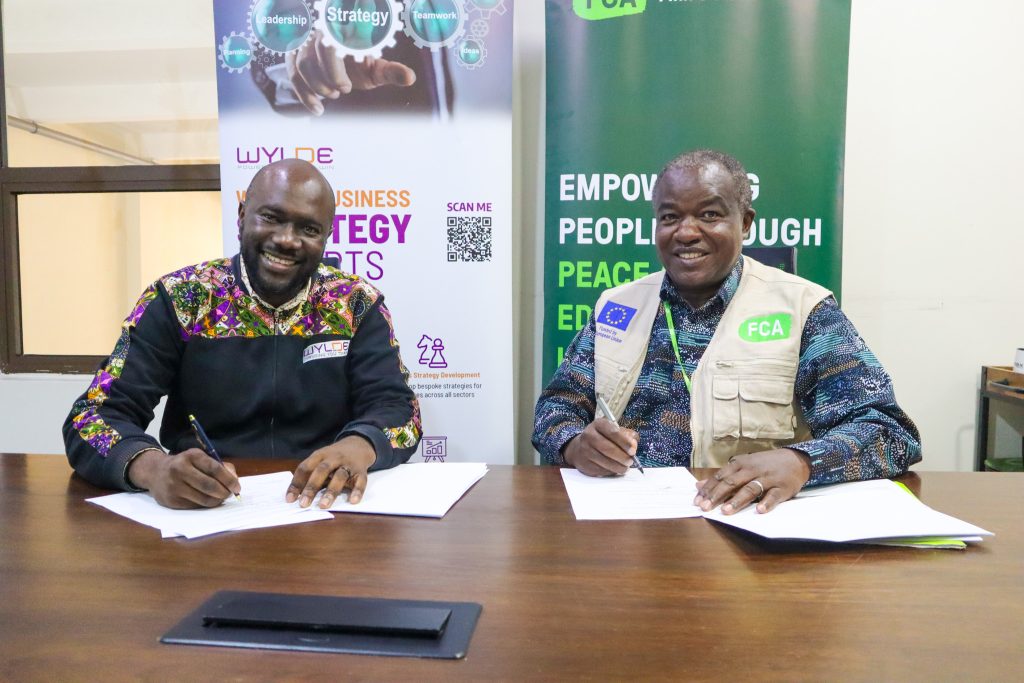Finn Church Aid and WYLDE International Sign Strategic MOU to Empower Entrepreneurs and Strengthen Livelihoods Across East Africa

Today, FCA Kenya, together with WYLDE International, signed a Memorandum of Understanding (MOU) to scale inclusive economic empowerment initiatives across its Creative Industries and WICE (Women in the Creative Economy) programs in Kenya. The partnership will equip youth and women with business skills, mentorship, and access to resources to build sustainable livelihoods.
This transformative partnership brings together two purpose-driven organisations with a shared vision: to unlock meaningful opportunities for youth, women, and underserved communities through enterprise development, skills building, and systemic change. The MOU was signed at WYLDE International’s Nairobi office, signalling a new phase of strategic collaboration grounded in the values of dignity, sustainability, and shared prosperity.
Chris Odongo, CEO of WYLDE International, emphasised the importance of the partnership:
“We are excited to join hands with Finn Church Aid to deliver impact at scale. Our mission has always been to build thriving entrepreneurs and resilient ecosystems. This partnership enables us to extend that mission by integrating our business acumen with FCA’s extensive development experience, particularly in fragile contexts. Together, we can support communities not just to survive, but to succeed through enterprise.”
The partnership will focus on designing and delivering entrepreneurship programs that equip youth and women with practical skills, mentorship, and access to the resources needed to launch and grow businesses. It will also prioritise the strengthening of small and growing businesses (SGBs), cooperatives, and community-based organisations through capacity building, access to finance, and market linkage interventions.
In addition, FCA and WYLDE will jointly develop scalable, locally owned solutions to address systemic challenges such as unemployment, financial exclusion, and limited access to business development services. Special attention will be given to vulnerable populations, including refugees and marginalised groups, to ensure that economic transformation is inclusive, locally driven, and sustainable. The collaboration will also include joint proposal development for funding opportunities, research and knowledge-sharing, and integrated monitoring and learning systems to measure long-term impact.
John Bongei, Country Director of FCA Kenya, reiterated FCA’s commitment to collaborative impact:
“By joining efforts, we can achieve more. Traditionally, NGOs like FCA have shied away from working with for-profit organisations. However, there is a paradigm shift—we now recognise the importance of private sector partnerships in creating sustainable impact.
The previous approach, while impactful, is no longer sustainable on its own. Through partnerships like this, we can meaningfully engage and achieve shared objectives—particularly in empowering young people.
FCA focuses on three key areas: peace, education, and livelihoods. As a rights-based organisation, we measure success by how well people are supported to access decent livelihoods and meet their basic needs. Through this partnership, the youth we serve in Nairobi will gain access to wider networks that will help them build skills and secure meaningful employment.”
This MOU reflects the growing momentum toward cross-sector partnerships that bridge development and private sector expertise to address Africa’s most pressing challenges. As the region continues to recover from global economic shocks, climate change, and displacement, the FCA–WYLDE alliance is poised to catalyse meaningful change where it’s needed most.
Read more: FCA Kenya and Macefoods Sign MoU to Boost Agribusiness in Rural Kenya
Text / Photo:Daisy Obare/FCA